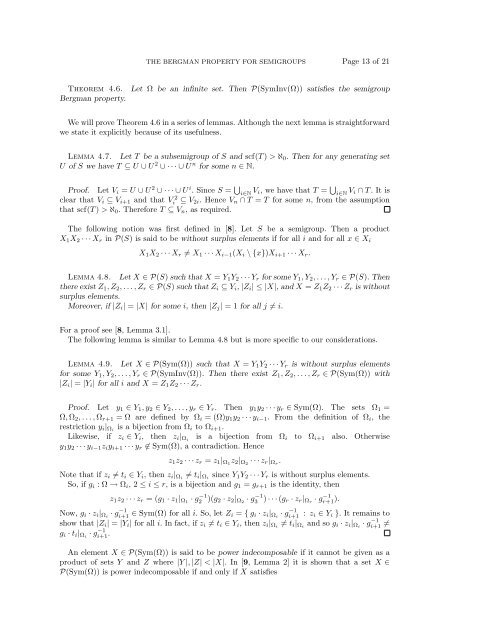The Bergman property for semigroups
The Bergman property for semigroups
The Bergman property for semigroups
You also want an ePaper? Increase the reach of your titles
YUMPU automatically turns print PDFs into web optimized ePapers that Google loves.
THE BERGMAN PROPERTY FOR SEMIGROUPS Page 13 of 21<br />
<strong>The</strong>orem 4.6.<br />
<strong>Bergman</strong> <strong>property</strong>.<br />
Let Ω be an infinite set. <strong>The</strong>n P(SymInv(Ω)) satisfies the semigroup<br />
We will prove <strong>The</strong>orem 4.6 in a series of lemmas. Although the next lemma is straight<strong>for</strong>ward<br />
we state it explicitly because of its usefulness.<br />
Lemma 4.7. Let T be a subsemigroup of S and scf(T ) > ℵ 0 . <strong>The</strong>n <strong>for</strong> any generating set<br />
U of S we have T ⊆ U ∪ U 2 ∪ · · · ∪ U n <strong>for</strong> some n ∈ N.<br />
Proof. Let V i = U ∪ U 2 ∪ · · · ∪ U i . Since S = ⋃ i∈N V i, we have that T = ⋃ i∈N V i ∩ T . It is<br />
clear that V i ⊆ V i+1 and that Vi<br />
2 ⊆ V 2i . Hence V n ∩ T = T <strong>for</strong> some n, from the assumption<br />
that scf(T ) > ℵ 0 . <strong>The</strong>re<strong>for</strong>e T ⊆ V n , as required.<br />
<strong>The</strong> following notion was first defined in [8]. Let S be a semigroup. <strong>The</strong>n a product<br />
X 1 X 2 · · · X r in P(S) is said to be without surplus elements if <strong>for</strong> all i and <strong>for</strong> all x ∈ X i<br />
X 1 X 2 · · · X r ≠ X 1 · · · X i−1 (X i \ {x})X i+1 · · · X r .<br />
Lemma 4.8. Let X ∈ P(S) such that X = Y 1 Y 2 · · · Y r <strong>for</strong> some Y 1 , Y 2 , . . . , Y r ∈ P(S). <strong>The</strong>n<br />
there exist Z 1 , Z 2 , . . . , Z r ∈ P(S) such that Z i ⊆ Y i , |Z i | ≤ |X|, and X = Z 1 Z 2 · · · Z r is without<br />
surplus elements.<br />
Moreover, if |Z i | = |X| <strong>for</strong> some i, then |Z j | = 1 <strong>for</strong> all j ≠ i.<br />
For a proof see [8, Lemma 3.1].<br />
<strong>The</strong> following lemma is similar to Lemma 4.8 but is more specific to our considerations.<br />
Lemma 4.9. Let X ∈ P(Sym(Ω)) such that X = Y 1 Y 2 · · · Y r is without surplus elements<br />
<strong>for</strong> some Y 1 , Y 2 , . . . , Y r ∈ P(SymInv(Ω)). <strong>The</strong>n there exist Z 1 , Z 2 , . . . , Z r ∈ P(Sym(Ω)) with<br />
|Z i | = |Y i | <strong>for</strong> all i and X = Z 1 Z 2 · · · Z r .<br />
Proof. Let y 1 ∈ Y 1 , y 2 ∈ Y 2 , . . . , y r ∈ Y r . <strong>The</strong>n y 1 y 2 · · · y r ∈ Sym(Ω). <strong>The</strong> sets Ω 1 =<br />
Ω, Ω 2 , . . . , Ω r+1 = Ω are defined by Ω i = (Ω)y 1 y 2 · · · y i−1 . From the definition of Ω i , the<br />
restriction y i | Ωi is a bijection from Ω i to Ω i+1 .<br />
Likewise, if z i ∈ Y i , then z i | Ωi is a bijection from Ω i to Ω i+1 also. Otherwise<br />
y 1 y 2 · · · y i−1 z i y i+1 · · · y r ∉ Sym(Ω), a contradiction. Hence<br />
z 1 z 2 · · · z r = z 1 | Ω1 z 2 | Ω2 · · · z r | Ωr .<br />
Note that if z i ≠ t i ∈ Y i , then z i | Ωi ≠ t i | Ωi since Y 1 Y 2 · · · Y r is without surplus elements.<br />
So, if g i : Ω → Ω i , 2 ≤ i ≤ r, is a bijection and g 1 = g r+1 is the identity, then<br />
z 1 z 2 · · · z r = (g 1 · z 1 | Ω1 · g −1<br />
2 )(g 2 · z 2 | Ω2 · g −1<br />
3 ) · · · (g r · z r | Ωr · g −1<br />
r+1 ).<br />
Now, g i · z i | Ωi · g −1<br />
i+1 ∈ Sym(Ω) <strong>for</strong> all i. So, let Z i = { g i · z i | Ωi · g −1<br />
i+1 : z i ∈ Y i }. It remains to<br />
show that |Z i | = |Y i | <strong>for</strong> all i. In fact, if z i ≠ t i ∈ Y i , then z i | Ωi ≠ t i | Ωi and so g i · z i | Ωi · g −1<br />
i+1 ≠<br />
g i · t i | Ωi · g −1<br />
i+1 .<br />
An element X ∈ P(Sym(Ω)) is said to be power indecomposable if it cannot be given as a<br />
product of sets Y and Z where |Y |, |Z| < |X|. In [9, Lemma 2] it is shown that a set X ∈<br />
P(Sym(Ω)) is power indecomposable if and only if X satisfies
















